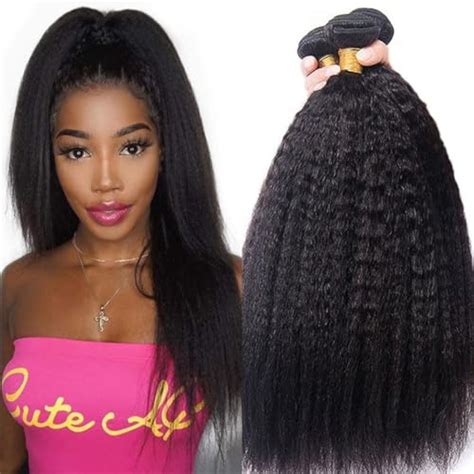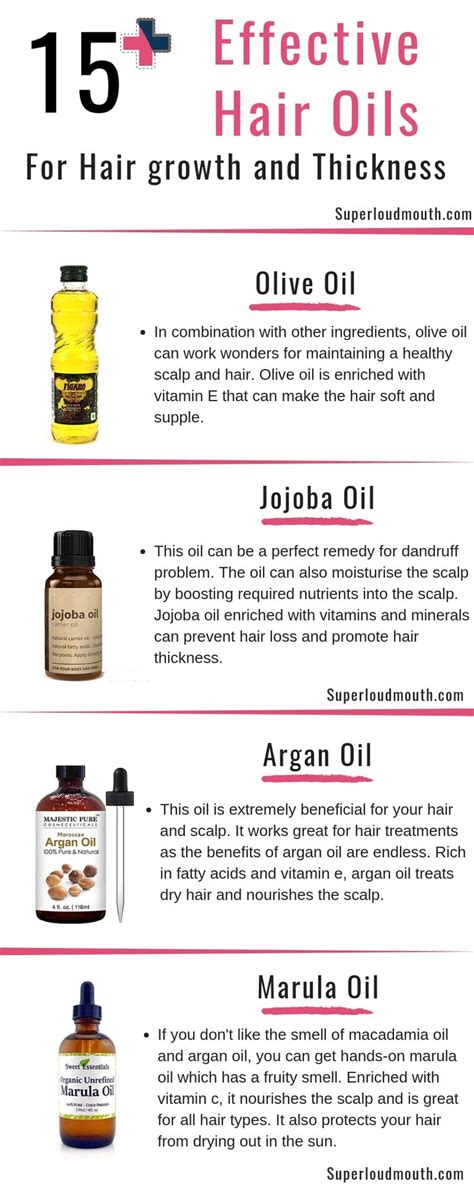At a glance, here are key things to keep in mind when choosing a hair oil for hair growth and thickness:

- Consider your hair type and needs. There are many different types of hair oils available, each with its own unique benefits. Some oils are better suited for certain hair types than others. For example, coconut oil is a good choice for dry, damaged hair, while jojoba oil is a good choice for oily hair.
- Look for oils that contain essential fatty acids. Essential fatty acids are important for hair growth and health. They help to nourish the hair follicles and promote hair growth. Some good sources of essential fatty acids include coconut oil, olive oil, and argan oil.
- Use hair oil regularly. To see the benefits of hair oil, it is important to use it regularly. Aim to apply hair oil to your hair at least once a week. You can apply it more often if your hair is dry or damaged.
- Be patient. It takes time to see the results of hair oil. Do not get discouraged if you do not see results immediately. Continue to use hair oil regularly and you will eventually see your hair become thicker and fuller.
Top 5 Hair Oils for Hair Growth and Thickness
There are many different hair oils on the market, but not all of them are created equal. Here are five of the best hair oils for hair growth and thickness:
- Coconut oil: Coconut oil is a rich source of essential fatty acids, which are important for hair growth and health. It also has antibacterial and antifungal properties, which can help to protect the scalp from infection.
- Olive oil: Olive oil is another good source of essential fatty acids. It also contains antioxidants, which can help to protect the hair from damage.
- Argan oil: Argan oil is a luxurious oil that is rich in essential fatty acids, antioxidants, and vitamins. It is a good choice for all hair types, but it is especially beneficial for dry, damaged hair.
- Jojoba oil: Jojoba oil is a plant-based oil that is very similar to the sebum that is naturally produced by the scalp. It is a good choice for oily hair, as it helps to regulate sebum production.
- Castor oil: Castor oil is a thick, viscous oil that is rich in ricinoleic acid. Ricinoleic acid has anti-inflammatory and antibacterial properties, which can help to promote hair growth and thickness.
How to Use Hair Oil for Hair Growth and Thickness
To use hair oil for hair growth and thickness, follow these steps:
- Start with clean, dry hair.
- Apply a small amount of hair oil to your scalp.
- Massage the oil into your scalp for a few minutes.
- Comb the oil through your hair from roots to tips.
- Leave the oil in your hair for at least 30 minutes.
- Rinse the oil out of your hair with warm water.
- Shampoo and condition your hair as usual.
You can use hair oil once or twice a week, or more often if your hair is dry or damaged.
Benefits of Using Hair Oil for Hair Growth and Thickness
There are many benefits to using hair oil for hair growth and thickness, including:
- Promotes hair growth
- Strengthens hair
- Reduces hair loss
- Improves hair texture
- Adds shine to hair
- Protects hair from damage
Common Mistakes to Avoid When Using Hair Oil for Hair Growth and Thickness
There are a few common mistakes to avoid when using hair oil for hair growth and thickness, including:
- Using too much oil: Using too much hair oil can weigh your hair down and make it look greasy. Start with a small amount of oil and increase the amount gradually as needed.
- Not massaging the oil into the scalp: Massaging the oil into the scalp helps to stimulate blood circulation and promote hair growth. Be sure to massage the oil into your scalp for a few minutes before combing it through your hair.
- Leaving the oil in your hair for too long: Leaving the oil in your hair for too long can clog your pores and lead to scalp problems. Rinse the oil out of your hair after 30 minutes to an hour.
- Not using hair oil regularly: To see the benefits of hair oil, it is important to use it regularly. Aim to apply hair oil to your hair at least once a week.
Why Hair Oil Matters
Hair oil is an important part of a healthy hair care routine. It can help to promote hair growth, strengthen hair, reduce hair loss, improve hair texture, add shine to hair, and protect hair from damage. If you are not already using hair oil, consider adding it to your routine today. You may be surprised at how much it can benefit your hair.
How to Find the Right Hair Oil for You
There are many different types of hair oils available, so it is important to find the right one for your hair type and needs. Here are a few things to keep in mind when choosing a hair oil:
- Your hair type: Some hair oils are better suited for certain hair types than others. For example, coconut oil is a good choice for dry, damaged hair, while jojoba oil is a good choice for oily hair.
- Your hair needs: If you are looking for a hair oil to promote hair growth, you will want to choose an oil that contains essential fatty acids. If you are looking for a hair oil to protect your hair from damage, you will want to choose an oil that contains antioxidants.
- Your budget: Hair oils can range in price from a few dollars to several hundred dollars. Choose an oil that fits your budget and needs.
Once you have considered these factors, you can start narrowing down your choices. Here are a few of the most popular hair oils available:
- Coconut oil: Coconut oil is a rich source of essential fatty acids, which are important for hair growth and health. It also has antibacterial and antifungal properties, which can help to protect the scalp from infection.
- Olive oil: Olive oil is another good source of essential fatty acids. It also contains antioxidants, which can help to protect the hair from damage.
- Argan oil: Argan oil is a luxurious oil that is rich in essential fatty acids, antioxidants, and vitamins. It is a good choice for all hair types, but it is especially beneficial for dry, damaged hair.
- Jojoba oil: Jojoba oil is a plant-based oil that is very similar to the sebum that is naturally produced by the scalp. It is a good choice for oily hair, as it helps to regulate sebum production.
- Castor oil: Castor oil is a thick, viscous oil that is rich in ricinoleic acid. Ricinoleic acid has anti-inflammatory and antibacterial properties, which can help to promote hair growth and thickness.
Tables
Table 1: Comparison of Hair Oils
| Hair Oil | Benefits | Drawbacks |
|---|---|---|
| Coconut oil | Promotes hair growth, strengthens hair, reduces hair loss, improves hair texture, adds shine to hair, protects hair from damage | Can weigh hair down, can be difficult to rinse out |
| Olive oil | Promotes hair growth, strengthens hair, reduces hair loss, improves hair texture, adds shine to hair, protects hair from damage | Can weigh hair down, can be difficult to rinse out |
| Argan oil | Promotes hair growth, strengthens hair, reduces hair loss, improves hair texture, adds shine to hair, protects hair from damage | Expensive |
| Jojoba oil | Regulates sebum production, promotes hair growth, strengthens hair, reduces hair loss, improves hair texture, adds shine to hair | Can be difficult to find |
| Castor oil | Promotes hair growth, strengthens hair, reduces hair loss, improves hair texture, adds shine to hair, protects hair from damage | Can be thick and viscous, can be difficult to rinse out |
Table 2: Hair Oil Benefits
| Benefit | How it Works |
|---|---|
| Promotes hair growth | Essential fatty acids nourish the hair follicles and promote hair growth. |
| Strengthens hair | Essential fatty acids and antioxidants help to strengthen the hair shaft and prevent breakage. |
| Reduces hair loss | Essential fatty acids and antioxidants help to reduce hair loss by promoting hair growth and strengthening the hair shaft. |
| Improves hair texture | Essential fatty acids and antioxidants help to improve hair texture by making it smoother and softer. |
| Adds shine to hair | Essential fatty acids and antioxidants help to add shine to hair by reflecting light. |
| Protects hair from damage | Antioxidants help to protect the hair from damage caused by free radicals. |
Table 3: Hair Oil Drawbacks
| Drawback | How to Avoid It |
|---|---|
| Can weigh hair down | Use a small amount of oil and massage it into the scalp. |
| Can be difficult to rinse out | Use a clarifying shampoo or rinse the oil out with warm water. |
| Can be expensive | Choose an oil that fits your budget and needs. |
| Can be difficult to find | Look for hair oils online or at specialty beauty stores. |
| Can be thick and viscous | Warm the oil before using it. |
Table 4: Hair Oil Tips
| Tip | Why it Matters |
|---|---|
| Use hair oil regularly | Regular use of hair oil helps to promote hair growth and thickness. |
| Massage the oil into the scalp | Massaging the oil into the scalp helps to stimulate blood circulation and promote hair growth. |
| Leave the oil in your hair for at least 30 minutes | Leaving the oil |
